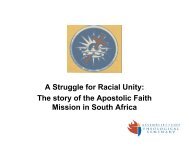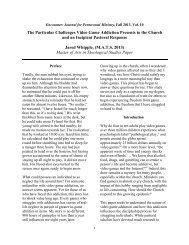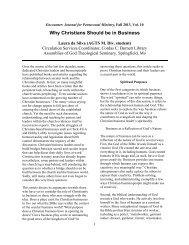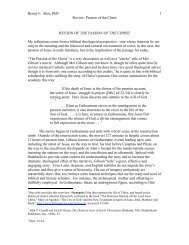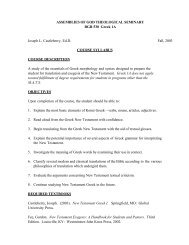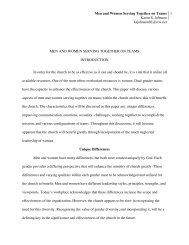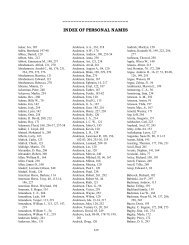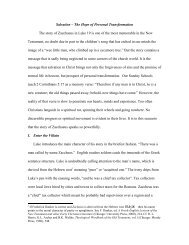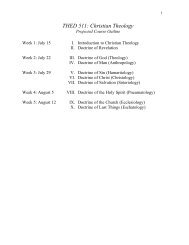Encounter: Journal for Pentecostal Ministry - Assemblies of God ...
Encounter: Journal for Pentecostal Ministry - Assemblies of God ...
Encounter: Journal for Pentecostal Ministry - Assemblies of God ...
Create successful ePaper yourself
Turn your PDF publications into a flip-book with our unique Google optimized e-Paper software.
challenged with the need to struggle more<br />
deeply with their own personal use <strong>of</strong><br />
possessions as Christ‟s followers. 120 Luke‟s<br />
understanding <strong>of</strong> this concept seems to<br />
encourage an introspective look on the<br />
sacrifice made <strong>for</strong> the sake <strong>of</strong> Christ and<br />
how this affects one‟s own possessions.<br />
This message is certainly applicable to the<br />
Christian Church today. While some rare<br />
cases exist in which one is asked to give up<br />
every possession, in most cases, it is<br />
uncommon when <strong>God</strong> asks Christians to sell<br />
everything they own. However, the Lukan<br />
text does <strong>for</strong>ce the believer to examine his or<br />
her own emphasis on possessions and what<br />
each has truly sacrificed <strong>for</strong> the sake <strong>of</strong><br />
Christ and His message. The Church must<br />
acknowledge this perspective as essential to<br />
its foundation and existence.<br />
Dangers <strong>of</strong> Wealth<br />
Luke spends a vast amount <strong>of</strong> time<br />
portraying the dangers <strong>of</strong> wealth through the<br />
use <strong>of</strong> parables and other explanations. He<br />
obviously recognizes the corruption<br />
resulting from the greed <strong>of</strong> those who look<br />
to their wealth as a source <strong>of</strong> identity and<br />
pride. Jesus recognizes the significant<br />
danger <strong>of</strong> wealth, particularly in the example<br />
<strong>of</strong> the religious elite. Many <strong>of</strong> Jesus‟ sayings<br />
personify the love <strong>of</strong> wealth as Mammon,<br />
meaning “possessions,” and equate such<br />
love as idolatry, as seen by the ancient<br />
Hebrew prophets as the means <strong>of</strong> drawing<br />
people away from dependence and<br />
commitment to <strong>God</strong>. 121 In fact, in the story<br />
<strong>of</strong> the Rich Ruler (Luke 18:24-30), the man<br />
becomes disheartened over the idea <strong>of</strong><br />
giving up his wealth. The result: “Jesus<br />
looked at him and said, „How hard it is <strong>for</strong><br />
the rich to enter the kingdom <strong>of</strong> <strong>God</strong>!<br />
Indeed, it is easier <strong>for</strong> a camel to go through<br />
the eye <strong>of</strong> a needle than <strong>for</strong> a rich man to<br />
enter the kingdom <strong>of</strong> <strong>God</strong>‟” (vv. 24-25).<br />
17<br />
This idea is difficult to combat, especially<br />
when such a large number <strong>of</strong> these types <strong>of</strong><br />
texts exist in Luke‟s writings. Luke<br />
consistently encourages the idea that wealth<br />
is a significant roadblock in the road to the<br />
kingdom, specifically in doing the will <strong>of</strong><br />
<strong>God</strong>. 122 “„How hard it is <strong>for</strong> those who have<br />
riches to enter the kingdom <strong>of</strong> <strong>God</strong>‟ sounds<br />
the theme, which is then relentlessly carried<br />
through. Only those who have left their<br />
goods behind are <strong>of</strong>fered the promise <strong>of</strong> the<br />
kingdom.” 123<br />
The ideas <strong>of</strong> wealth and discipleship appear<br />
conflicting in Luke‟s writing. 124 While Luke<br />
obviously desires to reveal the danger <strong>of</strong><br />
wealth, the believer can conclude that those<br />
in possession <strong>of</strong> material means must<br />
maintain a constant awareness regarding<br />
their status. As previously discussed, one<br />
cannot necessarily conclude that wealth<br />
equates with sin or <strong>God</strong>‟s blessings.<br />
However, Christians must recognize the ease<br />
with which material temptations might<br />
overtake a person who finds dependence on<br />
his or her own ability regarding finances.<br />
Luke‟s consistent reminders regarding the<br />
danger <strong>of</strong> wealth obviously reveal his<br />
emphasis on the importance <strong>of</strong> guarding<br />
one‟s heart from the spirit <strong>of</strong> Mammon.<br />
While wealth is not necessarily wrong,<br />
believers must constantly recognize <strong>God</strong> as<br />
the provider behind every possession.<br />
Members <strong>of</strong> the body <strong>of</strong> Christ should<br />
always regard themselves as under the<br />
sovereignty <strong>of</strong> <strong>God</strong> and His purposes when<br />
approaching financial obligations. This will<br />
affect the way the Christian lives and the<br />
way he or she uses money, especially<br />
regarding those in need.<br />
Instruction in Use <strong>of</strong> Wealth<br />
Finally, Luke heavily focuses on<br />
Jesus‟ exhortations regarding the<br />
right use <strong>of</strong> possessions. In Luke



